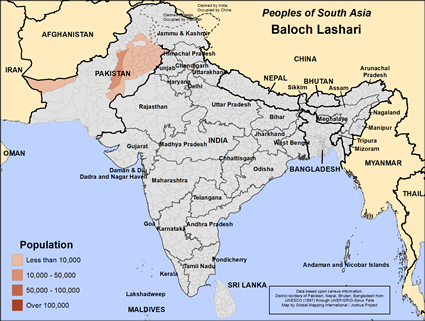Baloch Lashari in Pakistan

Photo Source:
Osama Balouch - Wikimedia
Creative Commons
|

Map Source:
People Group data: Omid. Map geography: UNESCO / GMI. Map Design: Joshua Project
|
| People Name: | Baloch Lashari |
| Country: | Pakistan |
| 10/40 Window: | Yes |
| Population: | 216,000 |
| World Population: | 216,000 |
| Primary Language: | Balochi, Eastern |
| Primary Religion: | Islam |
| Christian Adherents: | 0.00 % |
| Evangelicals: | 0.00 % |
| Scripture: | New Testament |
| Ministry Resources: | Yes |
| Jesus Film: | Yes |
| Audio Recordings: | Yes |
| People Cluster: | Baloch |
| Affinity Bloc: | South Asian Peoples |
| Progress Level: |
|
Introduction / History
The name "Baloch" might be derived from the name of the Babylonian king and god Belus. Others believe the word is a derivation of Sanskrit words "Bal" meaning strength and "Och" meaning high or magnificent.
The Baloch claim their origins to be in Aleppo in what is now Syria. They are descendants of Hazrat Ameer Hamza, the uncle of Islamic prophet Muhammad. Based on an analysis of the linguistic connections of the Balochi language, the original homeland of the Balochi tribes was likely the east or southeast area of the central Caspian region.
The Baloch generally live in remote mountainous and desert regions, which provides protection from invasions. They live mainly in the Balochistan region of the southeastern-most edge of the Iranian plateau in Pakistan, Iran and Afghanistan, as well as in the Arabian Peninsula. They are subdivided among over 130 tribes including the Lashari. The Lashari speak the Eastern Balochi dialect.
What Are Their Lives Like?
Lashari Baloch live according to tribal customs. Baloch men wear long shirts with long sleeves and loose pants. They sometimes wear turbans. Gold ornaments such as necklaces and bracelets are an important aspect of Baloch women's traditions. They usually wear a gold brooch that is used to fasten two parts of the dress together over the chest.
They pass traditions to children through oral history retelling. The tradition of a Baloch mother singing lullabies to her children has played an important role in the transfer of knowledge from generation to generation for many centuries.
What Are Their Beliefs?
Lashari Baloch are predominantly Sunni Muslims, but some are Shia Muslim. Balochi customs and traditions are conducted according to codes imposed by their tribal laws.
What Are Their Needs?
Few Baloch people ever get the chance to hear the life-saving gospel. They live in a part of the world where Christians are non-existent, and the Baloch peoples are all solidly Muslim. How will they hear?
Prayer Points
Pray that the Lashari Baloch may be open to Christ and his gospel messengers.
Pray that God will provide workers who speak the Balochi language to work with the Lashari Baloch people.
Pray for Lashari elders and family leaders to have dreams of the only savior, opening entire families to his goodness and grace.